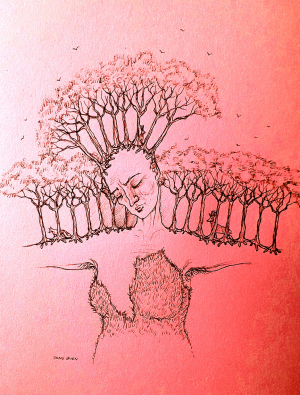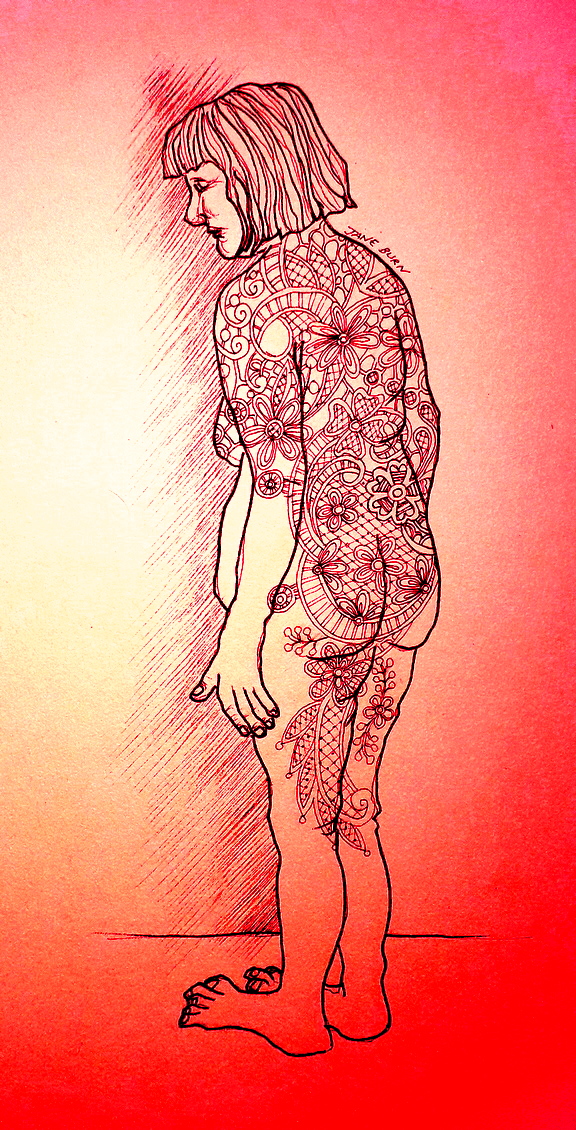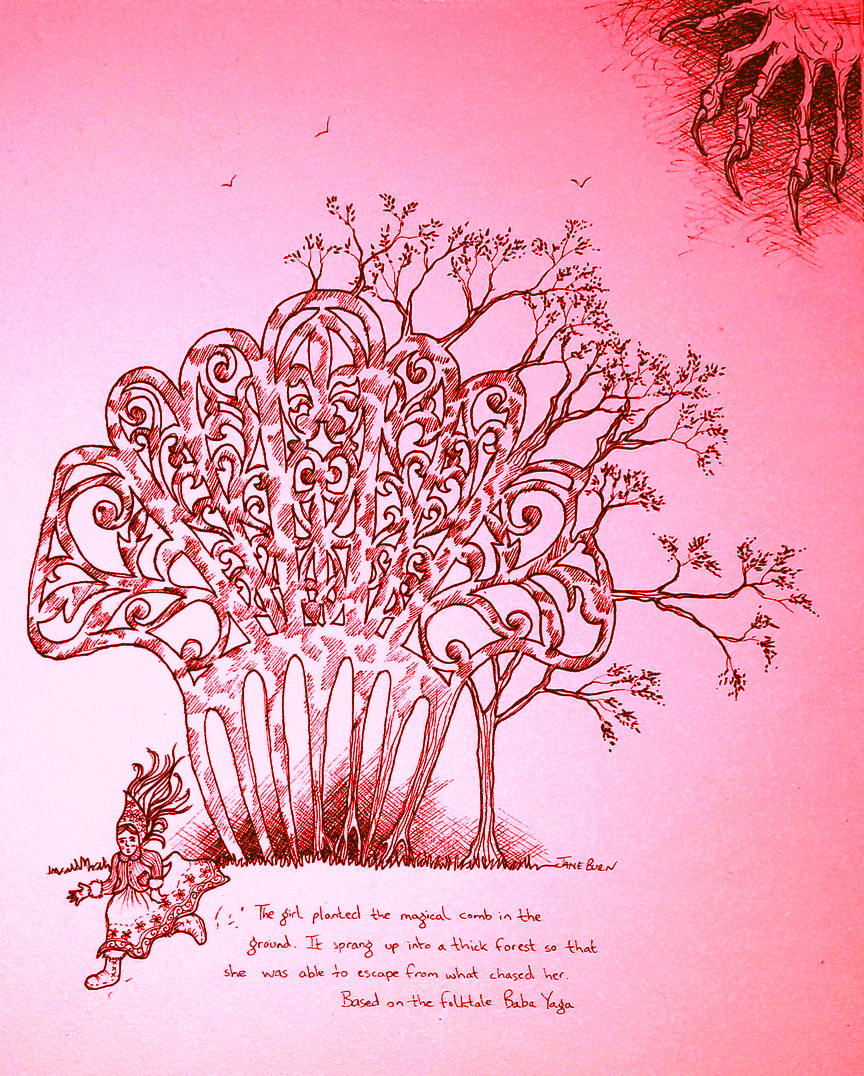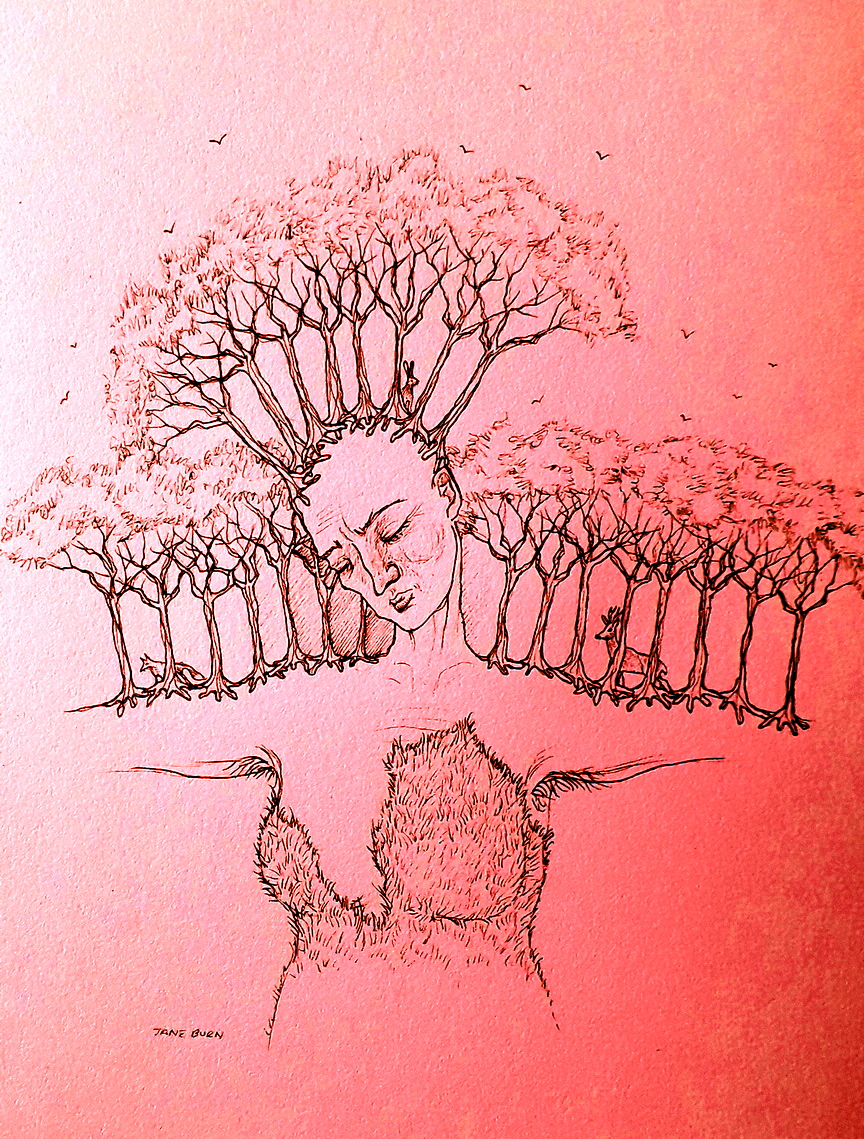
Choose to Challenge: International (Working) Women's Day 2021
Fran Lock introduces some poems for International (Working) Women's Day 2021. Images above and in text: Jane Burn
IWWD – or IWD as we're now supposed to call it – has had some pretty ropey “themes” in the past. But this year, I feel more positively inclined: 'Choose to Challenge' evokes the mutual and fiercely responsible feminism of Audre Lorde when she writes in 'The Uses of Anger: Women Responding to Racism': “I am not free while any woman is unfree, even when her shackles are very different from my own.”
Capitalism wants us to believe that feminism is all about personal empowerment, but that's an insidious neo-liberal lie, one that prioritises the pleasures and the privileges of individual women over the systemic oppression of their less powerful sisters. This version of feminism is fundamentally shallow and representational, preferring to focus on individual “success” stories rather than articulating a meaningful challenge to the structural dynamics of inequality.
More women joining the armed forces is not, for example, a triumph for women. Women and girls suffer disproportionately during and after war: existing inequalities are magnified as social institutions break down, rendering them more vulnerable to sexual violence and exploitation. Women and girls are better served by a radical dismantling of the military-industrial complex. More women in top banking jobs is not a triumph for women and girls. Women and girls suffer disproportionately under capitalism: we are daily harnessed as sources of domestic, sexual, and reproductive labour. The roles typically held by women are persistently miscategorised as “unskilled”; they offer us scant pay and little job security. When we do occupy top positions we are still paid less than our male colleagues.
Poverty and unemployment are intimately tied to the likelihood of our sexual exploitation and our victimisation at the hands of both partners inside the home and predators outside of it. For women, the trappings of wealth, and the signifiers of race and class, such as accent and grammar, are intimately linked in capitalist culture to perceptions of femininity, sexual availability and moral worth. We live, inside of capitalism, an irreconcilable double-bind. Our status as women is the very argument for our exploitation, but our identities as women – as women that capitalism sees as worthy of recognition and protection – are often erased by the work we perform. Do your shitty, exhausting, demeaning job, but do it with a smile, in flawless make-up and a body-shaping dress. Stay young and healthy, and positive at all times. Be a smiling facilitator to other people's needs.
Within neoliberal feminism, feminist goals are best achieved by each individual woman striving and competing to reach a position of power within capitalism. This is bullshit. Capitalism is inherently sexist and racist. It naturalises women's unpaid labour and deploys both sexism and racism as tools to divide and oppress workers, discouraging efforts to unionise, or to advocate for better pay. Why should an accommodation within that system be seen as a success?
Palming off unlovable paid labour
'Choose to challenge' might just serve as a recognition of these realities. We can choose to challenge not only individual instances of sexist aggression, but the ambient social conditions that give rise to them, and the political systems that produce those conditions. We can remember that while individual middle-class white women may be “empowered” by their top jobs, their success depends on palming off unlovable unpaid labour onto poorly-paid women lower down the socio-economic spectrum. We can remember that the ability to choose, the ability to challenge is in itself a function of privilege.
There are still women who do not have the ability to advocate for themselves, they are not safe and they are not secure, and the conditions of their oppression make it impossible for their voices to be heard. There are also women who cannot help but challenge: whose very bodies are considered an offence to capitalist culture and its relentless demands to reproduce certain narrowly prescriptive values and embodied forms. Where these women's black bodies, queer bodies, disabled bodies, fat bodies and poor bodies come into collision with capitalism, they are rendered dangerously vulnerable.
'Choose to challenge' is also about making space for each other; it is about celebrating each other in the face of a capitalist cultural narrative that turns us into competitors for attention and space. Yes, we are all different, but we are not special interest groups. We can extend our solidarity, a war-pact against all that besets us.

Ode to Self
By Golnoosh Nour
We survived and survival breeds desire for more self. – Audre Lorde
I am that
the fatigued knight wading through the morning light
like Moses gaping the Nile
I am that
the black rose in winter, dead
butterflies dripping from my bruised petals.
I am it
The ‘it factor’, the cool factor minus, the cold factor plus, the hot
mess, the browned flesh, the queer crushed
by Authority, forever refusing to agree with anything
other than my own elegant violence, my
autumnal tendencies that I catch in the river of my mirror – the only truth teller
for I am that,
the breathing painting in the attic
the ‘darling’ collector
the cold sore in summer
the sore throat in spring
the allergy screeching at the skin.
I am it
the blue silk with a scarlet kernel,
wrapped in my gold cape, embroidered by thorns, I pounce
over the fence into the abyss to caress
my horns, and to plant myself in fertile soil, roots hard in the ground;
shaking off tornados from my trembling naked branches, I grow tall,
old, short, skyward, enamoured,
pure.
Dr Golnoosh Nour is a poet and writer, whose acclaimed debut collection of short stories The Ministry of Guidance was recently published by Muswell Press, and whose forthcoming collection of poetry, the mighty Rocksong, will be published by the 87 Press next year. Golnoosh has been widely published and platformed both in the UK and internationally, including on the BBC and Granta. She teaches Creative Writing at the University of Bedfordshire and designs and hosts a monthly radio show called Queer Lit on Soho Radio Culture. For more info, visit her website: https://golnooshwriter.weebly.com/
On fire
By Sarah Wedderburn
I am a house,
face painted
geisha white,
mouth a strip
of polished black.
How still I pose,
dark eyes steady.
I am a house &
do not stir
as wisps of
dove grey chiffon
gather at my throat
to charge a tiny orange circlet
round my head.
I am a house
with smouldering eyes
& when the feathers
rising on my coronet
preen into an orange spiral
rushing up the air,
I do not blink.
I am a house.
Observe as lightly
from my eyes
I free a flock of
orange birds
that dart & hover everywhere.
I feed them all—
I am a house.
How quick the flaming
feathers of my birds
flare up & fan into
the great plumed
orange headdress
of an Aztec queen.
Rushing gold
rolls over me.
The blue above writhes
with nests of orange snakes.
I am a house
& meet the roar of sirens,
calm.
My gown collapses
in a firefly storm.
Am I stately
in my gauzy
slip,
my corset
boned & black?
I stand and smoke,
mascara
running down my face,
my secrets buried
in a foot of ash.
I am a house, strong enough
for love & hate.
Sarah Wedderburn’s publishing credits include Magma, MsLexia, Oxford Poetry, PAIN, PN Review, Poems in Which and The New European. She studied English at Oxford, holds a Poetry School MA and works as an arts writer. In 2020 her work was included in Culture Matters’ Witches, Warriors, Workers, and in Yvonne Reddick's Poetry, Grief and Healing.

When beggars choose
By Clare Saponia
There were no more dolls for me
after that. Just the three I’d doodled
on in indelible ink to spice up their
foolproof lives, since Santa failed
to bear frills. You know the kind:
the most basic theme-free sort
of Sindy that no kid ever asks for
with karmic Barbie at large. I gave
them bras and brains and specs
as big as potted mince. They got
lippie and piercings, freckles and
fringes they never knew existed
in their microbastic cosmos –
though they never grew back. Just
got shorter and shittier in the dull
Sunday lull, where not even the
hair wax helped. There was no
Paul or Ken either to come, my
folks fearful of what I’d draft
on a shaved, sexless crotch, the
far-too-deft cosmetic surgeries
I’d undertake, callous as they get:
Hannibal Lecter meets organ
collector, I think they might have said.
So, I kept them for the dog, played
find and fetch (not that she fetched) –
and just pastels for me from then on.
Clare Saponia is a Berlin-based writer, poet, artist and linguist. She has written two published poetry collections:The Oranges of Revolution and Copyrighting War and other Business Sins, and is working on her fourth. Clare’s poetry has featured in various anthologies, including Witches, Warriors, Workers, Emergency Verse – Poetry in Defence of the Welfare State, and soon The Brown Envelope Book.
I was a woman today
By Jane Burn
and I was not afraid of weather/not of glittered hoar
scalding bloom from early cowslips/not of brisking air/
I shucked pillows from their catchpenny shams/tawdry-bright/
pegged them baggy with vaults of biting wind/rise your bellies/
bloat with painted flowers/fly, my chintz-beloved ghosts
and I was not afraid of dust/walked upon a Galilee
of lint like a saviour of filth /not of the stove’s ash/
I ridded it with flags of soapy cloth/here are the kitchen
miracles/the hob roars with valiant soup/welcome
to my church of scraped potatoes/spoon and eat
and I was not afraid of swans/lucky against my tired docility/
they filled their throats with elevated light/an epiphany of air/
I heard the peal of monumental wings/watched their passing over
of my tethered home/saw them earn the clemency of blue sky/
O send thy softly breasts to bright rivers/amen, amen
and I was not afraid of time/not of the dials divided eye/
saw myself through years of perished skin/through slackening/
I grew a child/despair of clothes around my drooping womb/the years
blot my face with wearied moths/grope around my smile/
take my pity of hands and salve their crackled plight
and I was not afraid of what I write/though paper shrieks
beneath my raging pen/though I must empty my head of flames/
a long story of blood/my own uneasy/slipshod tell of truth/
I offer all my burdens to a book/and scribble rivers/
I love you/here are the umpteen many words I have for pain
Jane Burn is a multi-award winning poet who lives an eco-friendly lifestyle in a wooden cottage in Northumberland. Her poems are all about her adoration of language and how it connects her to the many passions and parts of her life. She is working class, a wife, a mother, bisexual, a poet, an artist and maker. She has written lots of poetry books and is also a late-diagnosed autistic which has helped everything finally make sense. Her poems are published in many magazines and anthologies. She co-edited the Culture Matters Witches, Warriors, Workers women's poetry anthology with her bosom friend Fran Lock. She is currently doing an MA in Writing Poetry at Newcastle University. Her next collection, Be Feared, is due out in November from Nine Arches Press.
the world is so big
By Fran Lock
a whiskey light where you might melt to know me. it is never coming.
a city night, all dangerous and fragrant. it is never coming. culottes in
spring are never coming: pale calf consumed by their shy mulberry
swish. the january sales will not be coming. the gelatin resentments
of a friend in tennis shoes, who's tearing up and hates you. first-bliss,
the nice perhaps of a hand. no, no, no. they are not coming. the sacred
wood. it is not coming. the clerk who holds my mourner's gaze, replete
with passing. she is not coming. the great and glistening tropes of old
dead men will not be coming, underlined or otherwise. my vivid adult
self, as she frequents the red and white striped awnings. now she will
not come. there will be no mornings. i will not dress my doting gloom
in coffee: poet, savant of hysterical sympathy. i will sing neither my
plights nor my fauverie desires. at nineteen, i am sotto in a sauntering
kingdom. my berlin-bowie cheekbones are turned up to eleven. i am
quiet gone. the world is so big. i'm a bug on the windscreen of its wide
horizon. it is dying's slick art that drips from me. how a footballer's
wife drips diamonds. how a brown dog's mouth drips wet grass. i will
not get lost, in the catacombs of loose amusement, wandering. bleating
in a fitted sheet, where shame is the interval and the circuit. it won't
bother me. women, shining in the strict garments of their monday
hustle. glamour as a lump of shit shimmering with flies, as a prophet
of your choice in a beard of bees. i won't have to care. windows
that open onto nothing, my eyes. not a latte or a beach or the boozy
ridiculm of living. the world is big, but the dead are without edges.
the absolute obscenity of emptiness. to be cupped by nothing. air.
Charcoal Lover
By Julia Bell
If not you, then who? Is what you said,
when I asked you why you loved me,
as if I were a foregone conclusion.
Then who?
I thought about this for a long time,
and all your possible suitors.
What do I have that they do not?
How did I win this accidental competition?
And then when we were getting ready for bed, I realised,
that it is not my strange good looks, or my air of experience,
but my charcoal toothpaste that won you over.
Something that the gummy locals and their brilliant teeth
have known about for centuries.
A new way to repackage you to me,
not as an immigrant then, but a source of native wisdom.
When we brush our teeth with soot, we look insane, homeless.
Like the shopkeepers with their mouths stained from khat or betel juice,
or yellowed from all the tobacco.
We look like urchins, ready to run off into deserted, dusty houses,
like lovers; like what we are: burned residue of the stars.
Julia Bell is a Writer and Reader in Creative Writing at Birkbeck. She has published three novels with Macmillan in the UK (Simon & Schuster in the US) and new book Radical Attention is now with Peninsula Press.

Jejunum
By Pauline Sewards
Amy’s life – a closed orbit from Boston to Boston.
Born in Massachusetts, died in Lincolnshire.
The surgeon fixed her with his knife,
she suffered from ulcers and gastric pain
Born in Massachusetts, died in Lincolnshire.
Jejune means hollow; the intestine empty at death,
she suffered from ulcers and gastric pain,
after the operation her guts became infected.
Jejune means hollow; the intestine empty at death.
Was surgery her choice? Was she given options?
After the operation her guts became infected.
Common causes of ulcer: hunger, ethanol, stress.
Was surgery her choice? Was she given options?
The surgeon fixed her with his knife.
Common causes of ulcer: hunger, ethanol and stress
Amy’s life – a closed orbit from Boston to Boston.
Pauline Sewards is a Bristol-based poet and founder of the regular event in Easton called 'Satellite of Love'. Her first collection This is the Band was published by Burning Eye in 2018. Her latest collection, Spirograph was published by Burning Eye earlier this year.
